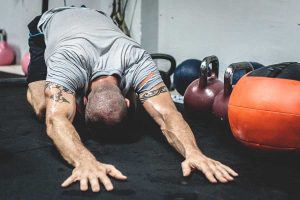
It’s that time of the year where many of us dive headfirst into a new exercise regime! Bring.It.On. That surge of ‘new year, new me’ motivation lights a fire under our butts and all of a sudden, we’re in the gym seven days a week!
But when our results don’t match the effort (why don’t I have a six pack already?), we quickly lose steam. Often, according to Sydney PT and former Cronulla Sharks legend Ben Lucas, this happens because we’ve forgotten about another incredibly important factor — recovery!
Yep, what you do after your workouts is just as important as what you do before or during. We asked Ben Lucas (who’s also the founder of trendsetting gym Flow Athletic on Oxford Street) to share his top tips for maximising your post-workout recovery:
Ben’s Five-step Recovery Plan:
1. Stretch it out
“While it’s kind of amusing to imagine a bulky rugby player doing child’s pose, it’s actually become the norm for athletes to incorporate yoga into their training schedules. Not only is it great for recovery and post-workout soreness, it actually helps build your strength as you tend to hold poses for quite a while. It’s also fantastic for balance, flexibility, mobility and mental endurance — all of which are essential for improving your athletic performance. I recommend doing at least 1-2 sessions of yoga per week — if it’s good enough for professional athletes, it’s good enough for you!”
2. Start rolling
“Those colourful foam cylinders you see at the gym aren’t just there to look pretty! Foam rolling has both amazing short-term and long-term benefits. Not only does it reduce your muscle soreness and tightness, it reduces your risk of injury and improves your mobility and flexibility. Foam rollers have a bigger surface area than massage balls, so are better for rolling out your calves, quads, hamstrings, glutes and the bigger muscle groups in general.”
3. Fuel your body correctly
“Whether your goal is to lose fat, gain muscle or prepare your body for an important event, your nutrition is incredibly important when it comes to recovery. It’s essential to feed your body a combination of protein and carbs after your workout, to help repair your muscles and build strength. You don’t need to eat white, starchy carbs, but quinoa, sweet potato and pumpkin are good examples of complex carbs to include in your diet. It’s also important to ensure you’re eating a lot of antioxidant-rich foods such as bright coloured fruit and vegetables, berries, as well as anti-inflammatory foods like turmeric.”
4. Supplement correctly
“It’s a good idea to supplement with magnesium if you train a lot, as this mineral often gets sweated out when you exercise. I also swear by BCAAs (amino acids) and Protein Powder.”
5. Get your float on
“I’m obsessed with Forever Floating Health Spa in Paddington. In fact, I’m there most weeks — especially when I’m training hard for a big event. Float tanks provide a great way to relax, restore and balance your mind and body. The water is heated to the temperature of your skin and contains 40% Epson salt (magnesium sulfate), which helps to orchestrate many bodily functions, from muscle wellness to energy production as well as the elimination of harmful toxins. Floating also allows you to neutralize gravity.This means your joints and nervous system are relieved of the pressure of gravity, giving your body extra energy for recovery.”
Check out our TRAINING TIPS section for more fitness advice from qualified professionals. While you’re at it, why not sign up to our newsletter and be the first to receive gym and class discounts, access to exclusive workouts, competitions and a whole lot of fitness information for living a healthy life in Sydney!



